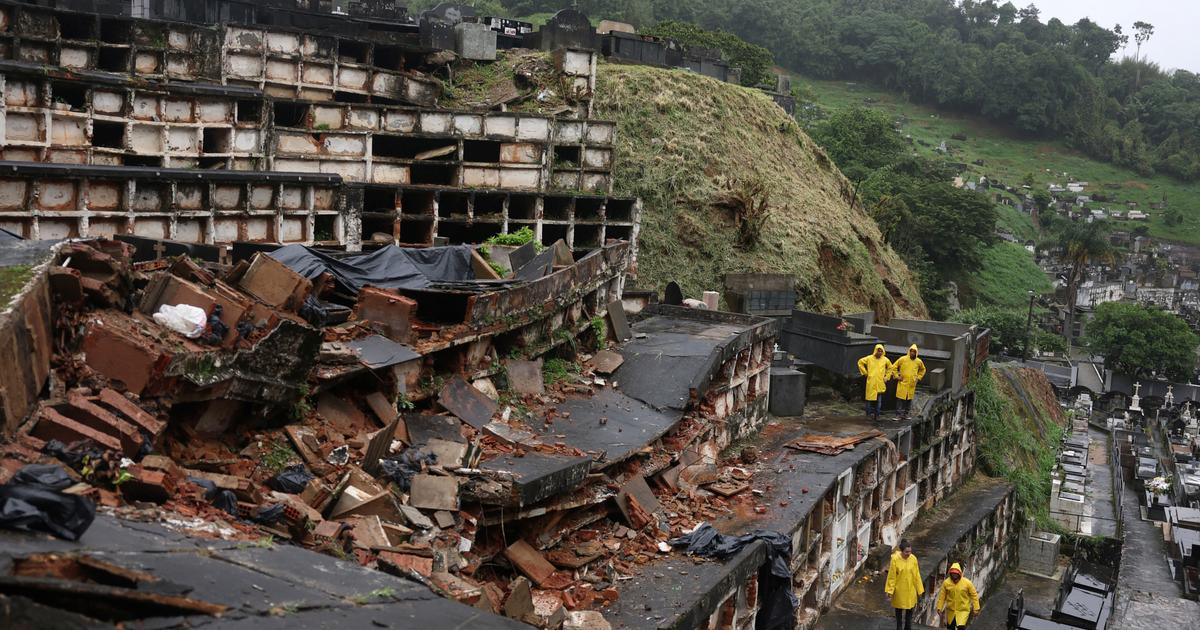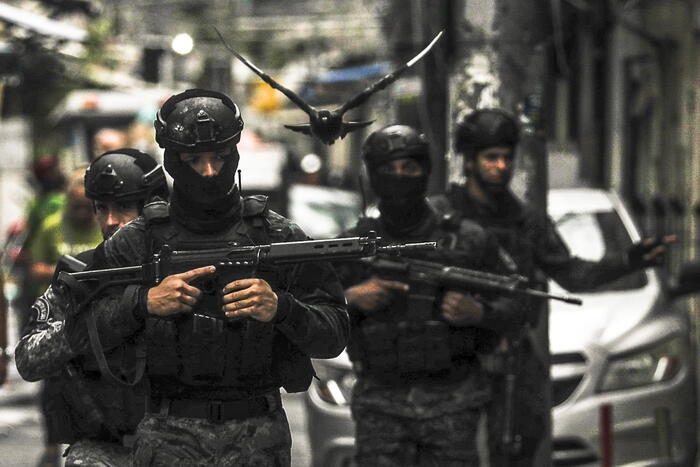Icon: enlarge
Catholic pastor Julio Lancellotti distributes breakfast to the homeless in Mooca, São Paulo
Photo:
Rogério Vieira / DER SPIEGEL
The day Tiago Ferreira de Almeira's normal life ended, he packed a few clothes and his important documents in a suitcase.
He just left his bed, the television, the rest of his belongings behind.
That day Ferreira had
lost his apartment in Bela Vista, a middle-class neighborhood of São Paulo.
Ferreira didn't know where to go.
Finally, he says, he ran to the square in front of the great Sé cathedral in the center of the city, where many homeless people sleep.
There he lay down on a blanket.
It rained on his first night on the street.
When Ferreira woke up, his clothes were soaked and the suitcase with the few clothes and his ID was gone.
Icon: enlarge
Tiago Ferreira de Almeira lost his job as a pastry maker during the crisis
Photo: Nicola Abé
Ferreira took shelter somewhere in the dark.
He was hungry and scared.
The next morning he met a strange woman.
"Her name was Maria," says Ferreira.
She bought him a burger at McDonalds.
"I cried then."
Until May last year, Ferreira, 29 years old, worked as a pastry assistant in the Brazilian chocolate factory in Copenhagen.
When the company laid off numerous employees during the corona pandemic, he no longer had enough money for the next rent, he says.
Icon: enlarge
Tents of the homeless in the entrance to the law school in central São Paulo
Photo: Rogério Vieira / DER SPIEGEL
Ferreira has been living on the street or in emergency shelters since June, sleeping in a different place every night.
He teamed up with a couple of new friends, one of whom lost his job as a teacher.
In Brazil, not all employees meet the formal criteria for unemployment assistance from the state.
Even before the corona crisis, the economy in the most populous country in South America stumbled, the middle class eroded and the number of homeless rose every year.
But since the pandemic raged in Brazil, fought by a half-hearted lockdown at the beginning, since the country slipped into a severe economic crisis and the unemployment rate reached record levels, the number of people living on the streets of big cities has exploded.
Volunteers estimate the increase in São Paulo, the largest and economically strongest city in South America, at 60 to 70 percent.
There are no official figures yet.
When it comes to food expenses for the homeless, the number of people waiting has more than tripled in some cases.
An NGO employee speaks of »horror scenarios«.
Another reports: “We are now constantly being asked beginner questions.
People want to know which street corner they can sleep safely on or whether they can come back here tomorrow to eat. "
Ferreira, the confectioner's assistant, is sitting at a plastic table in a hall in the Mooca district on a Monday morning in January, where the Catholic priest Julio Lancellotti is serving breakfast with the support of the city administration.
Ferreira is here for the first time.
He is drinking an orange juice.
In front of him is a dry roll and a packet of biscuits.
Icon: enlarge
Volunteers distribute food to those in need
Photo: Rogério Vieira / DER SPIEGEL
"I would never have thought in my life that I would get into this situation," he says, "and lo and behold," he snaps his fingers.
Then he has tears in his eyes.
Worst of all are hunger and the constant feeling of being dirty.
"This is the most terrible experience I have ever had in my life and the greatest humiliation."
A few meters away, Luciana Batista, 40, is breastfeeding her six-month-old son Gregory.
Her daughter Rebecca, five years old, proudly holds a glittering t-shirt in front of her chest, a donation of clothing.
Batista has been homeless for a month and a few days and is currently sleeping in an accommodation "with 100 women and 30 children in one room," she reports.
Icon: enlarge
Single mothers Caroline Francisco and Luciana Batista are both homeless
Photo: Rogério Vieira / DER SPIEGEL
She has to get out of there during the day.
Batista lost her job cleaning a shop.
She is a single mom and comes here every day now.
"We are seeing more and more families with small children who are becoming homeless and living in barracks on the side of the road," says Luiz Kohara Kukuzi, director of the human rights organization Centro Gaspar Garcia.
"This is a big change."
Many informal jobs have disappeared.
But millions of registered workers have also lost their jobs, waiters, salespeople and factory workers have been laid off - the lower middle class is slipping.
Unemployment, even the government predicts, could rise to more than 18 percent this year
climb.
The worst is yet to come.
"What I expect in the next few months is a humanitarian catastrophe," says Kohara.
Because the government in Brasília has stopped the monthly emergency aid it had paid until December.
67 million Brazilians, almost a third of the population, have made use of the payments of 600 real (around 90 euros) every month.
"That helped the people in the favelas to pay the rent or food," says Kohara.
They didn't have any savings.
Their situation is so fragile that they could end up on the street from one day to the next.
Icon: enlarge
Tens of thousands of people live in São Paulo, the largest and economically strongest city in South America, in house entrances, in public places, in highway tunnels, under bridges and on sidewalks
Photo: Rogério Vieira / DER SPIEGEL
Even before the crisis, tens of thousands in São Paulo populated every niche, public places, highway tunnels, traffic islands, bridges, house entrances, slept in tents that they decorated with fairy lights for Christmas, or barracks made of plastic sheeting on the sidewalks.
Some set up their belongings in front of the tents: an almost empty deodorant or shower gel, a barbie or a cuddly toy.
Others just lay on cardboard boxes in the sun on the sidewalk - wrapped in a gray fabric that is used to cover the floor when painting, their excrement a few meters away.
One Sunday morning, a black girl, maybe twelve years old, sleeps on her stomach on the sidewalk, with her lower body bare.
Icon: enlarge
Elvira Ferreira da Silva always keeps her tent clean and tidy
Photo:
Rogério Vieira / DER SPIEGEL
According to official figures, there were reportedly 24,000 homeless in São Paulo before the pandemic.
In the four years before that, there was already an increase of 65 percent.
Aid organizations consider the official figures to be a very understated.
This dystopian metropolis of inequality finds no answers to the crisis
So many new ones have arrived that apparently every free spot in this city, which has already been dense to the limit of pain, is now inhabited, occupied.
São Paulo, this dystopian metropolis of inequality, the city with the largest private helicopter fleet in the world and with millions of people living in favelas, cannot find any answers to the crisis.
At the beginning of the pandemic, the city administration set up showers, toilets and fountains in a few places to wash clothes or dishes.
An initiative to accommodate homeless people in hotels like in London or Hamburg failed because there were hardly any offers on the part of the hotels.
The responsible human rights secretariat of the city administration was not available to comment.
Icon: enlarge
The number of people serving food has more than tripled
Photo: Rogério Vieira / DER SPIEGEL
And politics continues to rely on deterrence and displacement.
Close to the Luz train station in the center of the city is Cracolandia, an area where a particularly large number of homeless people who are addicted to drugs live.
The police repeatedly attack people here with tear gas and pepper spray and force them to drive them away, even during the pandemic.
Around the square in front of the Sé Cathedral, no one is feared as much as the security forces: young homeless people report that police officers set fires, take their tents away or beat them up.
The city's rich have long since fled up into the air.
They are moving more and more away from the streets, the exhaust fumes, the constant traffic jams, the noise and the dirt, they withdraw into the penthouses of the high-rise towers and the gated communities, into their helicopters and private planes.
The middle class endures the misery on the ground.
Some give the homeless their rejected shirts or buy a bag of milk in the supermarket.
But especially in those neighborhoods where homelessness and economic interests collide, where real estate companies want to promote gentrification, conflicts arise.
Again and again fires are set or homeless people are given food mixed with broken glass or poison.
Even the helpers feel at risk.
Padre Lancellotti, 72, the Catholic pastor who has run a small church in the Mooca neighborhood for more than 30 years and who puts on his pink gas mask and hands out breakfast every morning except Saturdays, reports death threats on social media and verbal abuse on the street.
"That is the hatred of the poor," says Lancellotti, "as you hate the refugees in Europe, so the people here hate the poor." He speaks of "daily, institutionalized systematic violence against the homeless".
Icon: enlarge
For his work, Padre Lancellotti is threatened on social media and met with hostility on the street.
"That is the hatred of the poor," he says.
Photo: Rogério Vieira / DER SPIEGEL
The politician Eduardo Suplicy, currently for the Labor Party in the city council in São Paulo, has been campaigning for many years to improve the situation of the street dwellers.
Last year he passed a law through the city council to strengthen the human dignity and civil rights of the homeless.
Another legislative proposal will soon be voted on, which sets fixed standards for dealing with them - which the authorities should then adhere to.
But how difficult it is sometimes to actually implement laws in reality is shown by Suplicia’s greatest success: 17 years ago as a senator in Brasília he wrote a law according to which every Brazilian citizen should receive an unconditional basic income.
The law was passed by Congress and signed by then President Luiz Inácio Lula da Silva - and never applied.
Icon: enlarge
Homeless people in the historic center of São Paulo near the Sé Cathedral
Photo: Rogério Vieira / DER SPIEGEL
"Every day we see more people on the streets of São Paulo," says Suplicy, "that is why the time has come to introduce concepts such as the unconditional basic income." He is now fighting again with all his might.
And he sees himself on the road to success: Suplicy is now honorary chairman of a bipartisan group of more than 220 members in the Brazilian parliament that was formed last year to "defend the unconditional basic income."
However, the government of right-wing populist President Jair Bolsonaro has to approve the project.
"Turning emergency financial aid into a basic income and making it permanent would be the right step," says Kohara from the aid organization Centro Gaspar Garcia, which also runs a dropout program for the homeless.
In a society that is structured like the Brazilian one, in which a large proportion of people "work today to eat tomorrow," that is, are extremely vulnerable, an unconditional basic income could be a solution - provided it was set high enough.
“We saw very positive effects during the emergency aid payments.
Some homeless people have even merged, rented an apartment and set up a shared apartment, ”reports Kohara.
"Landing on the street is easy, the way back becomes more difficult every month," says one of his colleagues.
With every month on the street, the chance of a normal life decreased.
Icon: The mirror
This contribution is part of the Global Society project
What is the Global Society project? Up arrow Down arrow
Under the title Global Society, reporters from
Asia, Africa, Latin America and Europe
report on injustices in a globalized world, socio-political challenges and sustainable development.
The reports, analyzes, photo series, videos and podcasts appear in the international section of SPIEGEL.
The project is long-term and will be supported by the Bill & Melinda Gates Foundation (BMGF) for three years.
A detailed FAQ with questions and answers about the project can be found here.
What does the funding look like in concrete terms? Up arrow Down arrow
The Bill & Melinda Gates Foundation (BMGF) is supporting the project for three years with a total of around 2.3 million euros.
Is the journalistic content independent of the foundation? Up arrow Down arrow
Yes.
The editorial content is created without any influence from the Gates Foundation.
Do other media have similar projects? Up arrow Down arrow
Yes.
Major European media outlets such as "The Guardian" and "El País" have set up similar sections on their news pages with "Global Development" and "Planeta Futuro" with the support of the Gates Foundation.
Have there already been similar projects at SPIEGEL? Up arrow Down arrow
In recent years, SPIEGEL has already implemented two projects with the European Journalism Center (EJC) and the support of the Bill & Melinda Gates Foundation: The "Expedition The Day After Tomorrow" on global sustainability goals and the journalistic refugee project "The New Arrivals", as part of this several award-winning multimedia reports on the topics of migration and flight have emerged.
Where can I find all publications on Global Society? Up arrow Down arrow
The pieces can be found at SPIEGEL on the topic Global Society.








